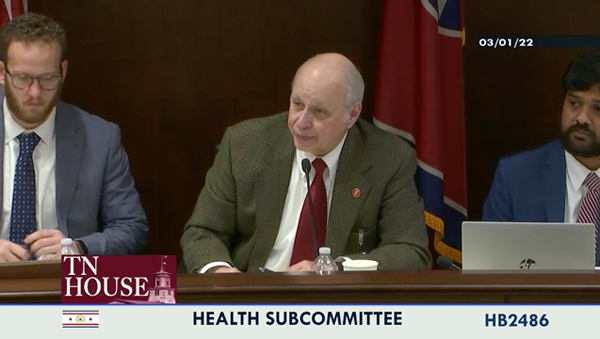
HB2486 (Patient Bill of Rights Act) died on the vine March 1, before it was even heard in the Tennessee House Health Subcommittee. Rep. David Byrd motioned to hear the bill. No other member of the committee seconded the motion—and the bill was dead. Dead.
[Tennessee House Health Subcommittee Members: Rep. Bob Ramsey, Chair (R-Blount Co.), Clark Boyd (R-Wilson Co.), David Byrd (R-Hardin Co.), Bob Freeman (D-Davidson Co.), Mark Hall (R-Bradley Co.), Darren Jernigan (D-Davidson Co.), Sabi Kumar (R-Robertson Co.), Pat Marsh (R-Bedford Co.), Paul Sherrell (R-White Co.), Bryan Terry (R-Rutherford Co.)]
Big med/big pharma organizations in Tennessee applauded the bill’s death, saying it was “dangerous” legislation and citizens would have abused the tenets of the proposed law.
What was so “dangerous” about this bill? Let’s take a brief look:
– Hospital treatment protocols. Patients and their families would have a right to refuse a particular course of treatment (medications, devices) and choose another. Hospitalists who do not agree with the patient’s choice can decline their assistance and another doctor can step in. Hospitalists who choose to agree with the patient’s choices cannot be punished by the hospital or by overreaching regulatory agencies.
Currently, patients in all U.S. hospitals are only administered one protocol via National Institutes of Health and Centers for Disease Control and Prevention guidelines and are refused any other treatments. In many cases, patients are forced to take medications and devices against their will, after having refused in writing and verbally.
In the last two years, doctors all across America have been punished and fired from hospitals for attempting to provide alternate treatments to patients.
– Emergency Use Authorized treatments. Patients would have a right to choose treatments from among ALL available treatments, not just treatments forced on them via NIH/CDC guidelines.
Currently, patients have only one choice for treatment, and despite Emergency Use Authorization laws, they are not told of other treatments and are not given the option to refuse one in favor of another.
– Transfer or release from care. Patients would be allowed to transfer to a different hospital or leave the hospital via hospice or “against medical advice.”
Currently, patients are refused transfer to any other hospital and are refused release (to hospice, for example), even when families have power of attorney and conservatorships. Patients are held in hospitals against their will.
– 24/7 advocate support. Patients would have the ability to choose an advocate to be by their side 24/7 in any area of the hospital, and this advocate would speak for the patient if he or she becomes incapacitated.
Currently, patients are not allowed to have a personal advocate; or a patient advocate is assigned by the hospital. This means the advocate works for the hospital. Patients have a right to choose their own advocate who will act in his or her best interest. This has always been a mainstay for healthcare—prior to January 2020.
– Freedom from restraint and sedation. Patients and their advocates would have the ability to refuse restraints and sedation and would not be forced to accept them against their will.
Currently, patients are routinely sedated and restrained against their will and without prior knowledge and consent. More egregiously, patients are sedated, restrained and then left alone for up to two days at a time with no food or water and no personal care, leaving patients lying in their own waste.
– Rooming with family. Patients with a family member in the hospital would be able to room with that family member.
Currently, if more than one member of a family are hospitalized, they are separated in different rooms.
– Organ transplant rights protection. Patients who choose not to get the COVID shot would not be discriminated against by removing him or her from transplant wait lists.
Currently, thousands of transplant hopefuls across the country have been removed from transplant lists and refused transplants because they chose not to get the shot.
– No discrimination for hospital admission or treatment. Patients who choose not to get the COVID shot would not be refused treatment or mistreated or treated differently because of their right to choose.
Currently, patients across the nation are being treated differently and even mistreated in hospitals because of their shot status.
– Patient rights notification. Hospitals would have to re-instate their pre-COVID patient bill of rights; patients would be given the hospital’s patient bill of rights on admission; and those rights would be publicly posted throughout the hospital.
Currently, Centers for Medicare & Medicaid Services granted waivers to U.S. hospitals to disregard and ignore their patient bill of rights. Some hospitals have even told patients and families they do not have a patient bill of rights.
But there is plenty in this bill that high-paid lobbyists and globalist organizations like the American (and Tennessee) Hospital Association should fear. Why? Because every one of these tenets would bring the torrential flow of cash into hospitals to a screeching halt. Every needless COVID death in our hospitals would come to an abrupt end with the passage of HB2486/SB2276.
Do you see anything “dangerous” in this proposed legislation? No? Of course not. It’s all common sense material. It’s shocking that we even have to try and legislate these ideas.













